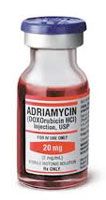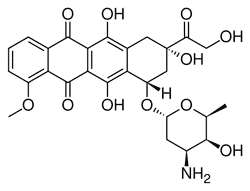Article
Effectiveness of Adriamycin Questioned in the Treatment of Patients With HER2-Positive Breast Cancer
Author(s):
HER2-positive women can be effectively treated with Herceptin (trastuzumab injection) without the use of Adriamycin.

According to a study published this week in The New England Journal of Medicine, HER2-positive women can be effectively treated with Herceptin (trastuzumab injection) without the use of Adriamycin, a drug that raises the risk of permanent heart damage. Herceptin—a molecularly targeted drug that is designed for HER2-positive patients with early-stage breast cancer, who comprise about 20% to 25% of new breast cancer diagnoses each year—when combined with carboplatin and Taxotere as chemotherapy, appears to increase survival of patients who are at risk of developing a particularly aggressive form of the disease.
The Breast Cancer International Research Group enrolled 3222 women with early-stage breast cancer between April 2001 and March 2004. The study placed patients into 3 different groups: patients taking Taxotere/carboplatin/Herceptin (TCH); patients taking the same regimen plus Adriamycin, an anthracycline commonly used in treating breast cancer patients (ACTH); and Adriamycin/carboplatin/Taxotere with no Herceptin (ACT). The patients were studied over a 5-year period.
According to the study, 92% of patients in the ACTH arm and 91% of patients in the TCH arm were alive after 5 years, compared to 87% in the ACT arm. The estimated disease-free survival was 81% in the TCH arm, 84% in the ACTH arm, and 75% in the ACT arm.

Patients who are treated with Adriamycin are at a higher risk of suffering permanent heart damage as a result of taking that chemotherapy, yet its effectiveness in the treatment of breast cancer has kept it available. However, the risk of heart damage increases even further when Adriamycin is taken in combination with Herceptin. The study authors suggest that while Adriamycin is a staple in treating patients, Herceptin with other chemotherapy agents might be a better method of delivering care.
“Given the data in this study, it makes one really question what role Adriamycin should play in the treatment of HER2-positive early breast cancer, or in the treatment of early breast cancer at all,” said Dennis J. Slamon, MD, PhD, director of the Revlon/UCLA Women’s Cancer Research Program at Jonsson Comprehensive Cancer Center, in a statement released with the study. “This trial should impact the way these breast cancers are treated, with a nonanthracycline regimen being our preferred option. I think this is a change that is going to be slow in coming, unfortunately, as many of our adjuvant treatments for breast cancer are built on the backbone of anthracyclines. While they’re effective, whatever gain patients may receive is more than made up for in the serious and chronic long-term side effects.”
The study found that women who received Adriamycin and Herceptin were 5 times more likely to experience congestive heart failure and twice as likely to experience sustained cardiac dysfunction without symptoms. A number of acute toxicities were also observed, including nausea, diarrhea, vomiting, neuropathy, fatigue, and falling white blood counts. In the study, 7 women taking anthracycline developed acute leukemia, and 1 woman in the non-Adriamycin arm developed an acute leukemia after receiving an anthracyline outside the study.
The study was sponsored by Sanofi-Aventis and Genentech and was funded in part by the Department of Defense, the Revlon/UCLA Women’s Cancer Research Program, the US Army Medical Research and Development Command, the National Cancer Institute, the California Breast Cancer Research Program, and the Peter and Denise Wittich Family Project for Emerging Therapies in Breast Cancer.









